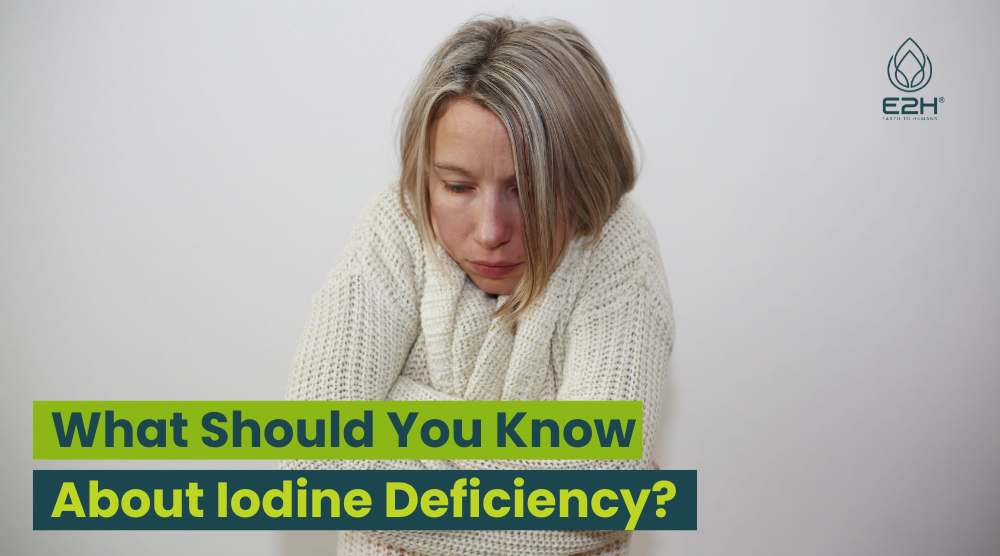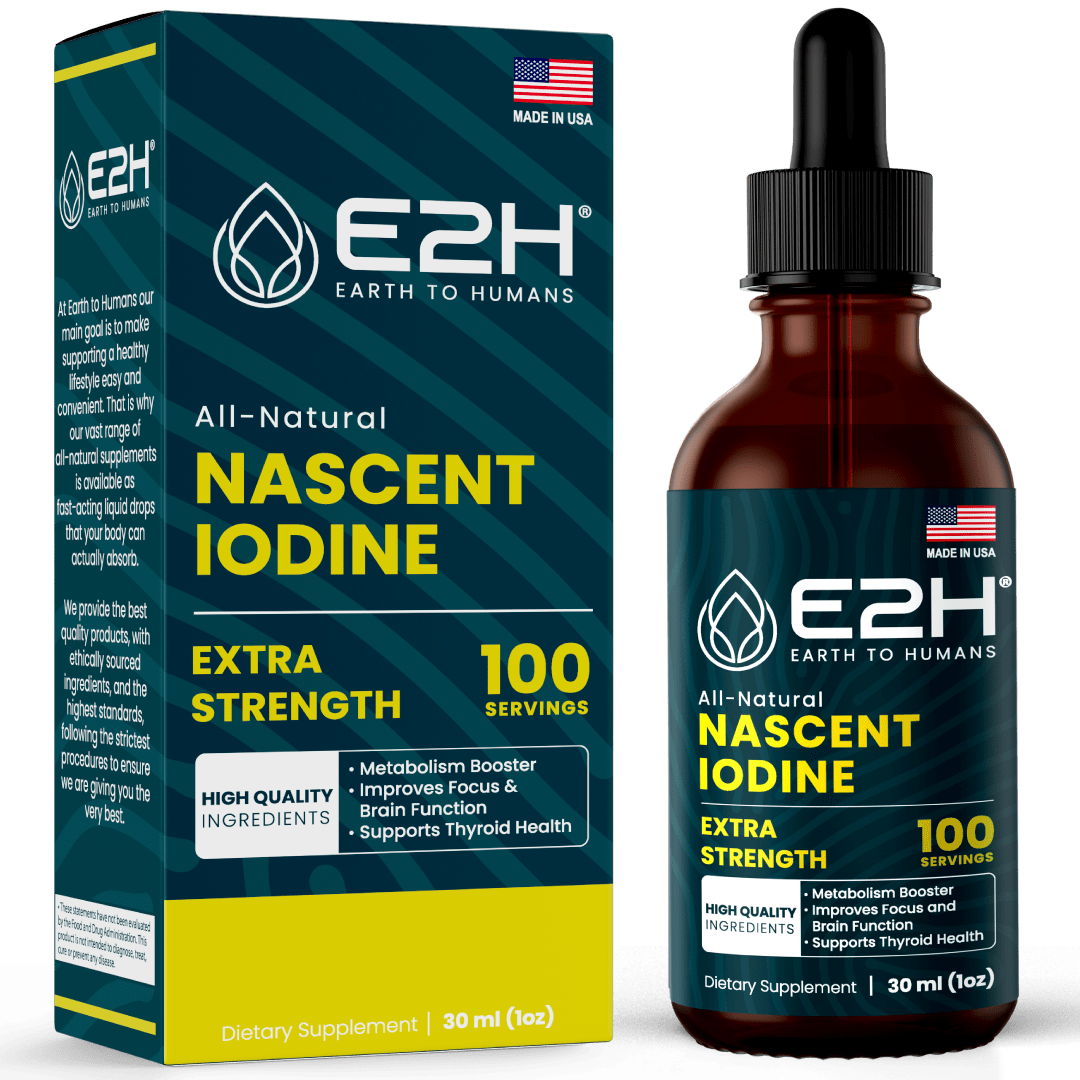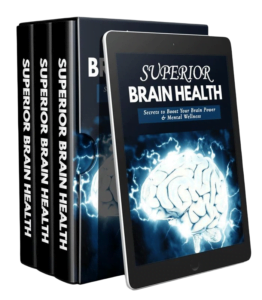Iodine is a trace mineral that is essential for human health. It is found in soil and water. It is necessary to produce thyroid hormones, which maintain almost every process in the human body. Iodine deficiency is much more common than you think it is. According to a recent statistical analysis, around 1.9 million people worldwide are affected by iodine deficiency disorders (IDDs).
In most cases, symptoms of iodine deficiency can be ambiguous. For example, you can gain weight suddenly out of nowhere in iodine deficiency. However, severe deficiency can cause many health problems, including goiter, hypothyroidism, and mental retardation. It can also increase the risk of miscarriage and birth defects. However,
Read through this blog to learn about iodine deficiency and how to prevent it.
What is iodine deficiency?
Iodine is needed by the thyroid gland, which produces thyroid hormones. Thyroid hormones then regulate several body functions, including metabolism and heart rate. Furthermore, these hormones make it possible for your cell to use food as energy.
When the dietary mineral iodine is insufficient, it causes iodine deficiency. Iodine deficiency in your body puts stress on the thyroid gland leading to low thyroid hormone levels or hypothyroidism. As a result, the thyroid gland can swell or get bigger. This abnormal enlargement of the thyroid gland is known as goiter.
Where is iodine deficiency most common?
Iodine is a necessary mineral that can cure underactive thyroid. However, the global iodine survey concluded that the diet of about one-third of eastern countries, especially European ones, is deficient in iodine [1].
Iodine deficiency is a universal problem that encompasses both developing and developed countries. Therefore, the general public needs to develop awareness to deal with the problem with utmost attention [2].
Iodine deficiency occurs from person to person, but it can cause physical and mental illnesses and impact pregnant women. According to the Iodine Global Network (IGN) research, the scorecard of iodine-deficient people has doubled from 67 in 2003 to 118 by 2020 [3].
What is an endemic goiter?
I have already told you that goiter is basically an enlarged thyroid gland. The abnormal increase in gland size can be because of iodine deficiency. If this iodine deficiency is predominantly related to diet, we will label the thyroid problem as endemic goiter.
In scientific literature, if the dietary iodine deficiency surpasses 5% of the general population, then experts define goiter in that area as endemic [4].

Iodine is necessary for your thyroid to make thyroid hormones. If you lack enough iodine, the thyroid will try to produce more thyroid hormone by growing and producing more cells. Although endemic goiter is the leading cause of thyroid disease globally, it is rare in the North of the United States due to improved diet [5].
What are iodine deficiency disorders?
Severe iodine deficiency is the most common cause of thyroid-related disorders [6]. Iodine deficiency disorders hugely impact pregnant women, causing problems in children’s brain development and low intelligence capacity.
Endemic goiter
As discussed before, the goiter or enlarged thyroid that occurs due to iodine-deficient water in certain regions is an endemic goiter. Iodine-deficient conditions mainly cause endemic goiter. If your body does not take enough iodine, thyroid glands become large [7]. Therefore, dietary iodine intake is required for your body to make healthy thyroid hormones.
Hypothyroidism
Hypothyroidism occurs when your thyroid gland does not make and distribute enough thyroid hormone into your blood. As a result, you experience slow metabolism, which hurts your entire body. Another known name for hypothyroidism is myxedema [8].
Thyroid hormones control several bodily functions, including the body’s metabolism rate, brain development in children, and the repair of tissues. Common symptoms that hypothyroidism patients may encounter include hair loss, nausea, weight gain, anxiety, and memory loss.
You will also notice similar findings in iodine deficiency, which leads to an underactive thyroid gland.
Cretinism
Cretinism is hypothyroidism in infants due to iodine deficiency during pregnancy. Another name for cretinism is congenital hypothyroidism [9]. It is a severe thyroid hormone shortage in infants. It results in poor brain development and physical abnormalities.

Enough iodine is required by a child’s body to produce thyroid hormones. Thyroid hormones are necessary for normal nervous system development, healthy growth, and brain development. Cretinism affects about one in 2,000 and two in 4,000 newborns worldwide [10].
Infertility
Severe iodine deficiency is a common cause of infertility in women of reproductive age. Once more, this is because enough iodine is required for the production of thyroxine. Moreover, an adequate amount of thyroxine in your blood is also needed to regulate reproductive hormones. Therefore, women with iodine deficiency face such outcomes.
An epidemiological research study reveals that women suffering from severe iodine deficiency find it more difficult to get pregnant than those with enough iodine in their diet [11].
Fetal mental retardation
The baby can suffer if a pregnant woman has a severe iodine deficiency. Thyroid glands, which help in infant learning and growth, particularly brain development, require an adequate amount of iodine to produce thyroid hormones. In addition, the baby might undergo mental retardation disorder if not given enough iodine[12].
What causes iodine deficiency?
A severe deficiency of iodine, also known as hypothyroidism, is due to a low intake of iodine. You should be smart enough to know about the adequate amount of iodine to fulfill your body’s daily requirements. Iodine should be consumed in 150 micrograms per day. Lesser than that leads to iodine deficiency and an underactive thyroid.
Diet low in iodine
You don’t have to eat more; you have to eat right. If you are an iodine-deficient patient, you must avoid a diet low in iodine to avoid suffering from an underactive thyroid and severe iodine deficiency. A Diet low in iodine includes [13]:

Non-iodized salt
Egg whites
Fruits
Fresh and raw vegetables
Unprocessed meat
Vegetable
Unsalted nuts
Dark chocolate
Iodine-free spices
Unsalted nuts and butter
Malabsorption syndromes
A digestive condition known as malabsorption syndrome inhibits your body from efficiently absorbing iodine from meals. There are several reasons, but most of them involve harm to the mucosal lining of the small intestine. In the small intestine, most of the absorption takes place.
Iodine malabsorption syndrome can lead to severe iodine deficiency when iodine intake is restricted over longer durations.
What are the symptoms of iodine deficiency?
Here are some primary symptoms of iodine deficiency.
Neck Swelling
The most obvious sign of a lack of iodine is swelling in your front neck. This condition is a goiter when the thyroid gland enlarges too much. A tiny shape of butterfly-like gland located at the front side of the neck is your thyroid gland. An obvious indication that the thyroid could be malfunctioning causes the swelling in your neck.
Weight gain
A healthy body has a healthy mind. To live a healthy and happy life, you must know that severe iodine deficiency can cause an increase in weight.
Lack of iodine causes weight gain. It’s essential to remember that weight gain is a sign of hypothyroidism, often known as severe iodine deficiency. Therefore, you should counter iodine deficiency with effective liquid iodine supplements to prevent unhealthy weight gain.
Weakness
Your body will burn fewer calories when at rest because your thyroid hormone levels are low [14]. Therefore, when you face iodine deficiency, your body cannot utilize calories, and you feel lethargic and fatigued. Sadly, this implies that more calories you consume are converted into fat.
The thyroid hormone directly affects your body’s metabolism [15]. If thyroid glands are iodine deficient, then the only way to stop weight gain and body weakness is by taking liquid iodine supplements.
Hair Loss
Alopecia, another name for hair loss, can signify that your body suffers from severe iodine deficiency. Since there aren’t enough thyroid hormones in a person’s diet when they consume less iodine, your hair cells’ growth stops. So, not having enough iodine intake can lead you to lose hair.
According to research, 3-8% of people with severe iodine deficiency suffer from hair loss [16].
Dry, coarse skin
Your thyroid-stimulating hormone consists of iodine which promotes the regeneration of skin cells. However, tissue regeneration doesn’t happen properly if your thyroid hormone levels are insufficient, which might result in dry and coarse skin[17].

A lack of iodine might make you sweat less and cause problems nourishing your skin’s cells.
Irregular periods
Your irregular and heavy periods can even be a symptom of low intake of iodine in your body [18]. According to one study, around 21% of total women with low concentrations of thyroid hormone had irregular menstrual periods [19].
Irregular periods are more frequent and more severe in women suffering from iodine-deficient conditions. This is because low thyroid hormone levels derange the menstrual periods.
Gastrointestinal symptoms
When your thyroid gland is not working correctly, you may experience gastrointestinal symptoms, including constipation and abdominal pain [20]. So, you must check your thyroid-stimulating hormone levels if experiencing these symptoms.
Changes in heart function
Suppose you have a heartbeat that is unusual and extremely slow. This condition may result from an iodine deficiency. You can feel tired, exhausted, drowsy, and even sick due to severe iodine deficiency [21].
If you do not have enough iodine, your heart may beat slower than average [22].
Pregnancy-related problems
Pregnancy-related problems can even be caused by severe iodine deficiency [23]. Therefore, it is a danger for pregnant women.
Due to their greater body demands, pregnant and nursing women should take extra care to get enough iodine. What’s better than a liquid iodine supplement to counter iodine deficiency in pregnant women?
How is iodine deficiency diagnosed?
If you suffer from symptoms like weight gain, hair loss, dry and flaky skin, and/or irregular periods. It is better to check your iodine level. Consult your doctor as soon as possible.
History and physical examination
Your doctor will take a complete medical history. History of iodine-deficient patients includes complaints of weight gain, hair loss, dry and flaky skin, irregular periods, weak memory, issues in pregnancy, and brain development.
Physical examination is done by checking thyroid size and looking for other body signs that confirm the findings.
Laboratory investigations
Your doctor may prescribe a blood test for thyroid-stimulating hormone (TSH). You could have further testing, which includes an ultrasound to examine your thyroid gland. But this would not be necessary, as thyroid disease can easily be diagnosed based on TSH levels.
If your thyroid-stimulating hormone levels are much lower than normal. You might suffer from iodine deficiency, as it is one of the most common causes of hypothyroidism. Therefore, start eating dietary iodine supplements in your daily diet.
Another laboratory test performed to check an adequate amount of iodine is the iodine patch test.
How is iodine deficiency treated?
If you love yourself enough, you must be conscious of adequate iodine intake by taking your supplemental iodine. Iodine deficiency is treated by consuming iodine supplements and food rich in iodine, such as iodine iodized salt, seaweed intake, and chicken, egg, and dairy products.
Lifestyle modifications
People suffering from iodine-deficient conditions must exercise daily to remain physically fit. Burn calories, so you do not gain weight. Sleep early to get healthy and fit. A healthy body can work thousands of times better than an ill person.
Iodine supplements
Iodine helps to produce healthy thyroid hormones, which support the healthy growth of the body and regulate metabolic rate. Therefore, dietary iodine supplements must be consumed daily, especially for people with severe deficiency.
Liquid iodine or tablets: Which one is better?
Most people, especially children, don’t consume enough iodine via tablets because they absorb slowly. So, if your iodine levels are low, a supplement with liquid iodine is recommended.
Yes, liquid iodine is considered to be better than iodine tablets. In addition, liquid iodine is considerably superior to utilize over pills as liquid iodine absorbs faster in your blood.
In addition to improving iodine absorption, liquid iodine has no adverse effects on the digestive system of your body [24]. Furthermore, the story of liquid iodine’s advantages continues. For example, a clinical investigation found that liquid iodine supplementation had more significant effects on hypothyroidism patients than tablet supplements [25].
Here you can have access to liquid iodine supplements from a credible source.
Which foods are rich in iodine?
Iodine is rich in foods, including seaweed, seafood, dairy, beef liver, kelp, chicken, and plant-based protein sources. However, fortified food, such as bread, cereals, and canned foods, has very little iodine.
Iodized salt
Table salt, sometimes referred to as iodized salt, has a sufficient amount of potassium iodide. Try to eat salt that has been iodine-enriched in your daily cooked meals to prevent iodine deficiency symptoms like hair loss, weight gain, and dry skin.
According to statistics from a research study, around 90% of Americans nowadays are aware of and have access to iodine-iodized salt in their everyday lives [26].
Seafood
You must consume seafood, including fish and shellfish if you are iodine deficient. This is because fish that are low in cholesterol have more iodine than fish that are high in calories.
You can also find 13 different iodine-rich foods here that you can eat to avoid hypothyroidism
How can you prevent iodine deficiency?
Prevention is the key to the cure. You can consume adequate iodine by consuming liquid iodine supplements and eating foods high in iodine, such as shellfish., seaweed intake, dairy products, liver of beef, and prunes.
When to see a doctor?
You should visit your doctor if your symptoms are not improving even after taking iodine supplements. In that case, you would probably need medications.
The bottom line
After reading all the above information, you know that almost all of your body is under the control of the thyroid gland, which needs iodine for proper functioning. Additionally, if you have low iodine intake, you will experience several symptoms like weight gain, slow heartbeat, constipation, and several others. Nobody wants these symptoms. Therefore, it’s time to ponder for a few minutes and opt for a liquid iodine supplement before it’s too late.
References
1. Delange F. Iodine deficiency in Europe and its consequences: an update. European Journal of Nuclear Medicine and Molecular Imaging. 2002 Aug 1;29 Suppl 2:S404-416.
2. Li M, Eastman CJ. The changing epidemiology of iodine deficiency. Nature Reviews Endocrinology. 2012 Apr 3;8(7):434–40.
3. Zimmermann MB, Andersson M. GLOBAL ENDOCRINOLOGY: Global perspectives in endocrinology: coverage of iodized salt programs and iodine status in 2020. European Journal of Endocrinology. 2021 Jul 1;185(1):R13–21.
4. Macchia PE, Fenzi G. [Endemic goiter: clinical picture and evolution]. Annali dell’Istituto Superiore Di Sanita. 1998;34(3):307–10.
5. Schiel JB, Wepfer AJ. Distributional Aspects of Endemic Goiter in the United States. Economic Geography. 1976 Apr;52(2):116.
6. Australia H. Iodine deficiency [Internet]. www.healthdirect.gov.au. 2021 [cited 2022 Oct 9]. Available from: https://www.healthdirect.gov.au/iodine-deficiency#:~:text=Iodine%20deficiency%20is%20the%20most
7. Cleveland Clinic. Goiter | Cleveland Clinic [Internet]. Cleveland Clinic. 2019 [cited 2022 Oct 9]. Available from: https://my.clevelandclinic.org/health/diseases/12625-goiter
8. What You Need to Know About Hypothyroidism [Internet]. Healthline. 2022 [cited 2022 Oct 9]. Available from: https://www.healthline.com/health/hypothyroidism/symptoms-treatments-more#:~:text=What%20is%20hypothyroidism%3F
9. Watson S. Congenital Hypothyroidism [Internet]. Healthline. Healthline Media; 2018 [cited 2022 Oct 9]. Available from: https://www.healthline.com/health/congenital-hypothyroidism
10. Rastogi MV, LaFranchi SH. Congenital hypothyroidism. Orphanet Journal of Rare Diseases. 2010 Jun 10;5(1).
11. Kuehn B. Iodine Deficiency May Impair Fertility. JAMA. 2018 Feb 27;319(8):760.
12. Skeaff S. Iodine Deficiency in Pregnancy: The Effect on Neurodevelopment in the Child. Nutrients. 2011 Feb 18;3(2):265–73.
13. Low Iodine Diet: Benefits, Precautions, and Foods to Eat [Internet]. Healthline. 2020 [cited 2022 Oct 9]. Available from: https://www.healthline.com/nutrition/low-iodine-diet-benefits-precautions-and-foods-to-eat
14. Kim B. Thyroid Hormone as a Determinant of Energy Expenditure and the Basal Metabolic Rate. Thyroid. 2008 Feb;18(2):141–4.
15. Danforth E, Burger A. The role of thyroid hormones in the control of energy expenditure. Clinics in Endocrinology and Metabolism. 1984 Nov;13(3):581–95.
16. Carlé A, Pedersen IB, Knudsen N, Perrild H, Ovesen L, Laurberg P. Hypothyroid symptoms and the likelihood of overt thyroid failure: a population-based case-control study. European Journal of Endocrinology. 2014 Nov;171(5):593–602.
17. Safer JD. Thyroid hormone action on the skin. Dermato-endocrinology. 2011;3(3):211–5.
18. Weeks AD. Menorrhagia and hypothyroidism. BMJ : British Medical Journal. 2000 Mar 4;320(7235):649.
19. KOUTRAS DA. Disturbances of Menstruation in Thyroid Disease. Annals of the New York Academy of Sciences. 1997 Jun;816(1 Adolescent Gy):280–4.
20. Thyroid Conditions and Digestive Problems [Internet]. Endoscopy Center of Washington, D.C. [cited 2022 Oct 9]. Available from: https://endodc.com/news/thyroid-conditions-and-digestive-problems
21. Grais IM, Sowers JR. Thyroid and the Heart. The American Journal of Medicine. 2014 Aug;127(8):691–8.
22. Kim MI. Hypothyroidism in the Elderly [Internet]. Nih.gov. MDText.com, Inc.; 2017. Available from: https://www.ncbi.nlm.nih.gov/books/NBK279005/
23. Zimmermann MB. The Effects of Iodine Deficiency in Pregnancy and Infancy. Pediatric and Perinatal Epidemiology. 2012 Jun 28;26:108–17.
24. Fallahi P, Ferrari SM, Ruffilli I, Ragusa F, Biricotti M, Materazzi G, et al. Advancements in the treatment of hypothyroidism with L-T4 liquid formulation or soft gel capsule: an update. Expert Opinion on Drug Delivery. 2016 Aug 30;14(5):647–55.
25. Fallahi P, Ferrari SM, Ruffilli I, Ragusa F, Materazzi G, Miccoli P, et al. MON-565 Patients Thyroidectomized For Thyroid Cancer (without Malabsorption) In Treatment With Oral Liquid L-thyroxine (L-T4) Formulation. Journal of the Endocrine Society. 2019 Apr;3(Supplement_1).
26. Leung A, Braverman L, Pearce E. Erratum: History of U.S. Iodine Fortification and Supplementation; Nutrients 2012, 4, 1740–1746. Nutrients. 2017 Sep 5;9(9):976.
27. Gunnarsdottir I, Gustavsdottir AG, Thorsdottir I. Iodine intake and status in Iceland through a period of 60 years. Food & Nutrition Research. 2009 May 27;53(0).
- What are the proven health benefits of iodine? - March 26, 2023
- What Should You Know About Iodine Deficiency? - February 27, 2023
- What is Atomic Iodine? Unveiling the Vital Importance You Need to Know - December 6, 2022










